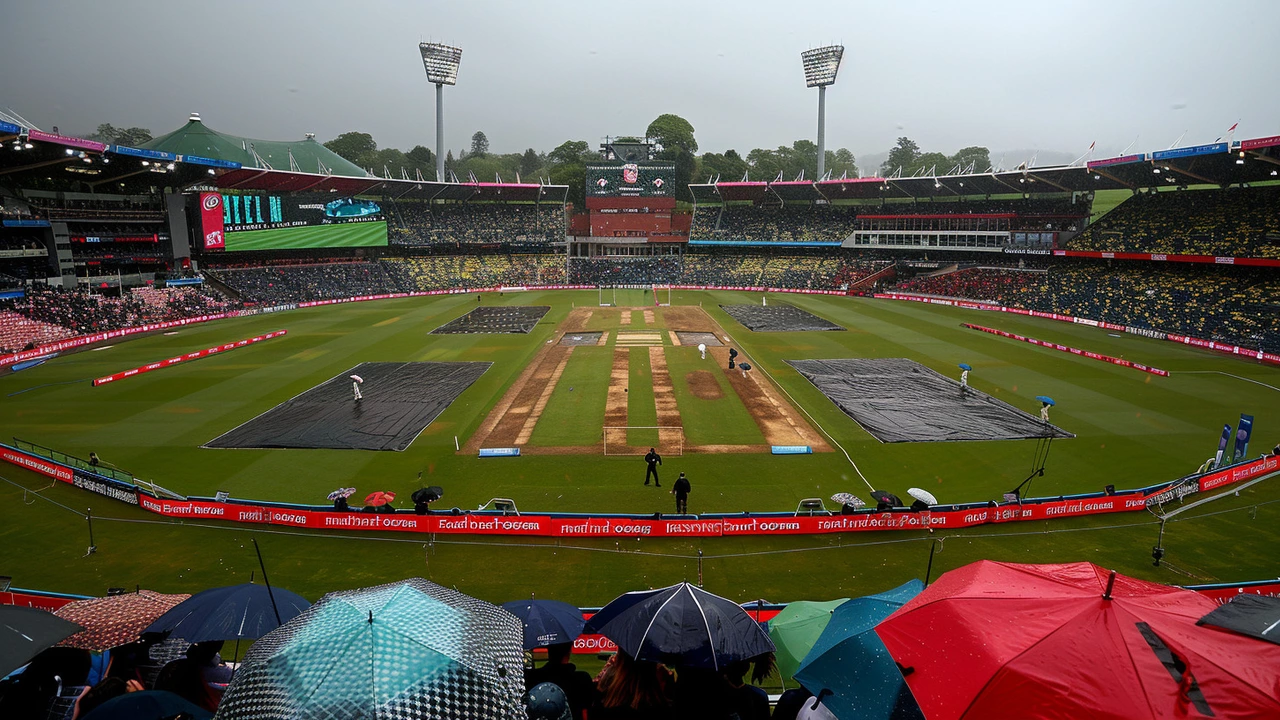Rain Halts Third T20I Clash Between England and Pakistan, Dampening Series
The third T20 International (T20I) between England and Pakistan, scheduled to be held at Cardiff, was abandoned without a single ball being bowled due to incessant rain. The heavy downpour on Tuesday meant that the game could not even progress to the toss, marking a disappointing turn of events for both teams and fans alike.
This abandonment was the second in the ongoing series, raising concerns about its impact on the squads' readiness for the forthcoming T20 World Cup. Prior to this, only 39.2 overs had been bowled amidst unpredictable weather conditions.
Details of the Abandonment
The players and officials waited anxiously in hopes that the weather would clear up, but the persistent rainfall throughout the day rendered the pitch unplayable. Eventually, the umpires called off the match, citing concerns over player safety and the state of the field.
England Captain Jos Buttler was not in Cardiff, as he remained with his wife, who is expecting their third child. In his absence, the experienced Moeen Ali was set to lead the side. Ali, who has showcased leadership skills previously, expressed disappointment over the washout but emphasized the importance of safety first.
Mark Wood was prepared to make his first appearance since early March, a comeback eagerly anticipated by both the player and fans. Likewise, Sam Curran, who had been sidelined during the previous match, was eager to make an impact. Unfortunately, the rain thwarted their plans, denying them vital match practice.
Impact on Preparation and Schedule
With Jos Buttler expected to rejoin the squad on Friday, there was hope he would return in time for the series' final fixture at The Oval. However, the weather forecast for this concluding match isn't encouraging, casting doubts over its completion. Should the final game also succumb to rain, it would mean significant lost opportunities for both teams to fine-tune their strategies for the World Cup.
The uncertainty in schedule and missed matches place England and Pakistan at a relative disadvantage. Unlike some other nations, neither team will have the luxury of official warm-up matches prior to the world tournament. This lack of preparation could affect team harmony and performance during the competition's high-pressure moments.
Historical Context and Future Implications
The washouts in this series have highlighted the unpredictable nature of the English weather, reminding us of the importance of contingency planning in international sports schedules. Cricket boards may need to consider indoor venues or alternate locations to ensure matches go ahead as planned.
The situation has resulted in frustration for the players, support staff, sponsors, and fans who anticipate these fixtures with great enthusiasm. Cricket lovers who had traveled to Cardiff or tuned in on television were left disappointed, missing out on the thrilling, fast-paced entertainment T20 cricket offers.
For England, managing their player roster while adapting to these disruptions is key. With exceptional talents like Jofra Archer being rested, the team has to balance rest periods and game time, ensuring peak performance levels without risking injuries. Similar sentiments are echoed within the Pakistani camp, as every game offers vital exposure and experience, especially for younger players gearing up for international stages.
As the T20 World Cup draws near, it becomes increasingly crucial for teams to adjust their training schedules. Coaches must innovate, using practice sessions that simulate match conditions, helping maintain competitive readiness. Team strategists have to analyze retrospective performances and data, attempting to predict and adapt to opponents’ strategies effectively.
This T20I series between England and Pakistan promises anticipation and intensity, but the disruptive rain has underscored the unpredictability inherent in outdoor sports. As nations gear up for global tournaments, weather contingencies and flexible planning could make the difference between success and missed opportunities. Let’s hope the weather gods show some mercy as we approach what promises to be an exciting showcase of international cricket.
